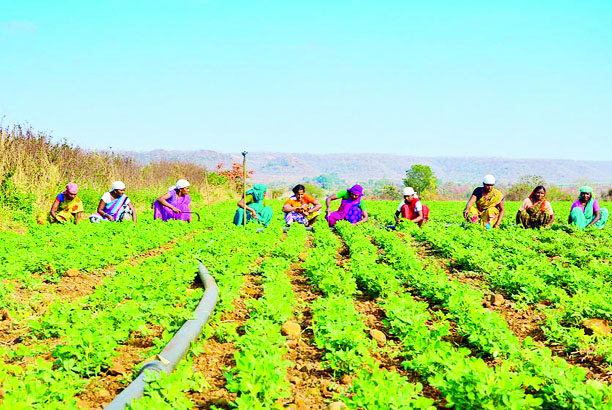Prof (Dr) R D Gupta
The green revolution witnessed the use of inorganic fertilizers and chemical pesticides which helped many developed(Industralised ) and developing countries in agricultural production and ,thereby, maintaining food security (Arya and Sharma , 2021).Its strategies ,however, paid off handsomely in India , with food gain production rising from 115.6 million tonnes in 1960-61 to more than 281.37 million tonnes in 2018-19. In the same way, annual fertilizer consumption rose from 0.07 million tonnes in 1951-52 to more than 29.95 million tonnes during 2016-17. The Green Revolution on the other hand , brought it with an excessive use of fertilizers which resulted into a soil health imbalance by eradicating beneficial microorganisms, deficiency of micro nutrients, especially of Zn and secondary nutrients particularly of Ca and Mg. In light of the above, innovative approaches like natural farming, and or organic farming were used by some scientists and farmers as an alternative to conventional agriculture to solve the issue of soil fertility loss, health and short term crop yield benefit
Natural Farming
Natural farming is a kind of sustainable agriculture that always utilizes natural inputs and follows the laws of nature, and respects the rights of crops grown and rearing of livestock. The aforesaid strategy always works in tandem with each farmed area’s natural biodiversity. This allows the complexity of living species, both plants and animals that shape each ecosystem to survive alongside food plants. Masanobu Fukuoka (1913-2008) invented natural farming commonly known as the Fukuoka Method”, the natural way of farming” or “do nothing farming? The phrase was coined by Fukuoka, a Japanese farmer and philosopher, in his book. The one straw Revolution in 1975-According to Fukuoka, farming was both a way of providing food and an artistic or spiritual approach to life with the ultimate goal of cultivation and perfection of human beings
Principles of natural farming
No Tillage: First and the fore most principle of organic agriculture will be no ploughing or turning of the soil. Although farmers are of the view that the ploughing of the fields is essential for cultivating the crop which they are doing for the ages. However, on the other hand tillage is non-vital for the natural farming (Arya and Sharma, 2021). Machines can only plough about 20cm whereas earthworms can dig up the soil up to 7 meters depth.Thus the best soil is occurred by the excretions of the earthworms.
No Use of Pesticides : There is no use of pesticides such as fungicide, bactericide, nematicide, insecticide, herbicide etc. It is because use of pesticides are not Just for killing fungi, bacteria, nematodes insects and herbs but they are also damaging our ecosystem and biodiversity. They can do major harm to human’s body and even future generations if ingested. Growing disease and insect resistant crops are required to be grown in a healthy environment which is the reasonable approach to diseases and insects control. To control pests always utilize light, alcohol, scent, deadly plants etc.
No Application of chemical fertilizers
In natural farming not even a single use of chemical fertilizers like urea, phosphate and potash is used to replace these nitrogenous, phosphatic fertilizers, organic manures like FYM(farm yard manure), vermicompost, vermiwash, biofertilizers etc., are used to replace nitrogen phosphorus, potassium, calcium and other compounds.
Natural Farming In India
In India Subhash Palekar, a well known agriculturalist of Maharashtra having been conferred with Padma Shri Award, promoted the technique of natural farming widely in Karnataka as zero budget natural farming (ZBNF) as reported by Arya and Sharma(2021). Later on Finance Minister Smt Nirmala Sitharaman stressed upon zero budget in her speech during the 17th farming Lok Sabha’s on July 2019. The term “Zero Budget Farming” came into spotlight at that time.
In natural farming the farmers always employ the application of farm yard manure and composts prepared from cow dung ,urine, human excreta after preparing from well decomposed processes. It always reduces the farmers investment and also protects the soils from being degradation. The finest form of chemical free farming is zero budget faraming is based on traditional vedic ways.
Natural farming is considered as one of the most promising crop farming approach for lowering production cost, by eliminating reliance on market for crucial inputs purchase. It delivers a slew of ecological and social benefits as an agroecologically diversified farming approach. Through diversified multilayered cropping system, it lowers farmers costs by eliminating external inputs and utilizing in situ resources to renew the soil while simultaneously improving incomes, restoring ecosystem /soil health and increasing climate reliance.Hilly areas like J&K , HP ,Uttrakhand ,North Eastern Hill states and western and Eastern Ghats are having lot of potential for natural farming. SKUAST has dedicated organic farming research centre (OFRC). Farmers /entrepreneurs can interact with Scientists at Chatha about it.
(The author is Ex Associate Dean Cum Chief Scientist(KVK) , SKUAST- J)
Trending Now
E-Paper


